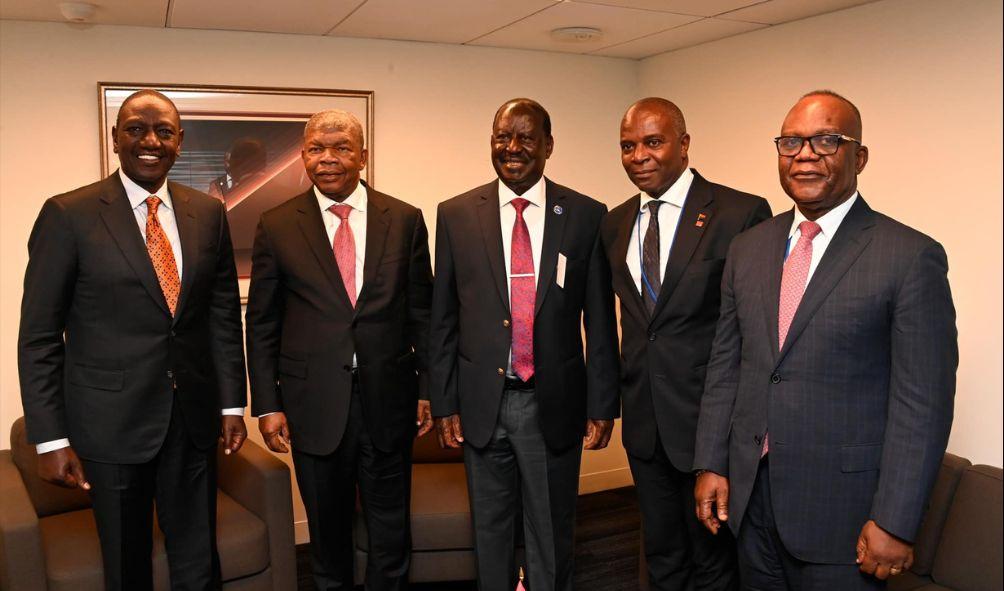Ruto Shifts Raila’s AUC Focus to Tricky West Africa
President William Ruto has ramped up efforts to secure the chairmanship of the African Union Commission (AUC) for Kenya, while Raila Odinga’s team is now concentrating on garnering support from Francophone nations.
Last week, President Ruto laid the groundwork for Mr. Odinga’s campaigns in West Africa by meeting with Senegal’s President Bassirou Diomaye Faye during the 79th United Nations General Assembly (UNGA) in New York, where he advocated for Mr. Odinga’s candidacy.
Elkanah Odembo, co-chair of Mr. Odinga’s campaign secretariat and former Kenyan ambassador to the U.S., emphasized that although their efforts span the entire continent, they are now prioritizing Francophone nations to bolster Kenya’s bid.
Odembo announced that Mr. Odinga plans to visit several Francophone countries shortly, where he will present his case for candidacy.
“The challenge from Francophone nations is being taken very seriously. Alongside the meetings in New York, our candidate has received invitations from several Francophone countries, including Ivory Coast, Togo, Senegal, Algeria, and Morocco,” Mr. Odembo shared with Nation.
Mr. Odinga is competing against Djibouti’s Foreign Minister Mahmoud Youssouf, former Mauritius Foreign Minister Anil Kumarsingh Gayan, and Richard James Randriamandrato, a former Malagasy foreign minister.
While in New York on Wednesday, President Ruto also engaged with Angola’s President João Lourenço to discuss “strengthening the African Union.”
ALSO READ:
- USA Offers Teaching Jobs for Kenyans to Teach Kiswahili – Apply by May 16
- Make April your winning month with AfroPari!
- Why Money Collected From Tourists Was Banked in Swiss Accounts – Gov’t
- Hanna Cheptumo Says Her Family Is Worth Ksh.420 Million During Cabinet Vetting
- Ruto’s Gender CS Pick Blames Femicide on ‘Greedy Women Chasing Money’ — Claims Education and Independence Could Stop the Killings
He further held discussions with South African President Cyril Ramaphosa and Malawi’s President Lazarus Chakwera.
These meetings followed a series of campaigns that took place during the Forum on China-Africa Cooperation (FOCAC) Summit in Beijing, China.
President Ruto sought the endorsements of leaders like Paul Kagame of Rwanda, Umaro Sissoco Embalo of Guinea-Bissau, Faure Essozimna Gnassingbe of Togo, Mahamat Idriss Deby Itno of Chad, Colonel Assimi Goita of Mali, and Hakainde Hichilema of Zambia for Mr. Odinga’s candidacy.
This marked the first outreach by Dr. Ruto to leaders from the Western bloc since announcing Mr. Odinga’s candidacy on August 27.
Mr. Odinga emphasizes his strategic aim to leverage Africa’s abundant human and natural resources for the benefit of its people, positioning himself as the “optimal choice” for the role.
He has committed to advocating for the elimination of visa requirements for intra-African travel and the dismantling of trade barriers. His vision also includes a unified continent characterized by peace and prosperity for all.
Mr. Odinga is aiming to replace Mr. Moussa Faki Mahamat, whose term concludes in February next year.
Former Kenyan ambassador to Korea Ngovi Kitau pointed out that to secure the seat in next year’s election, Kenya’s candidate must demonstrate clarity, knowledge, and the authority necessary to effectively lead Africa.
ALSO READ: Speaker Wetangula Backs Gachagua Impeachment Amid Growing Political Tensions
“Additionally, a thorough campaign strategy is crucial to garner support at three levels: national, continental, and global. There exists a disconnect at the national level that needs to be addressed,” he stated.
Mr. Ngovi highlighted that the involvement of at least 40 special envoys over three months is essential to enhance regular diplomatic efforts and expedite campaigns ahead of the February 2025 elections.
“The special envoys will be tasked with negotiating with the 16 countries and regions involved in African Summitry, setting the stage for Raila’s one-on-one discussions with African Heads of State.”
He cautioned that a failure in this bid could have severe consequences for Kenya, potentially leading to diplomatic, economic, and political challenges, including a drop in foreign direct investment.
Gilbert Khadiagala, a professor of International Relations and Diplomacy, noted that while Djibouti boasts a formidable candidate, Kenya appears to have a slight edge in terms of numbers and reputation.
“The significant hurdle in mobilizing support beyond Eastern and Southern Africa is the Francophone issue: many West African Francophone and Lusophone nations may not back the Kenyan candidate.
“These nations (under the Islamic organization) have already indicated they will not support a non-Francophone candidate. Therefore, unless the campaign addresses this cultural, linguistic, and religious divide, it will be challenging for Raila to succeed.”
Ruto Shifts Raila’s AUC Focus to Tricky West Africa
